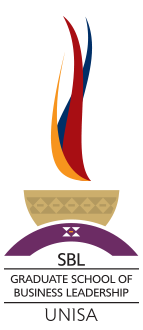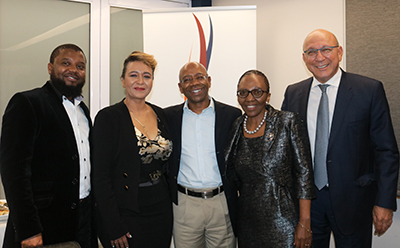
A ground-breaking discussion on the state of ethical and moral leadership in corporate South Africa took place at the Unisa Graduate School of Leadership (SBL) on 22 March 2018. The bare facts were laid on the table by keynote speaker, Mr Trevor Manuel, Chairman of Old Mutual Group Holdings and panellists Mr Bonang Mohale, CEO of Business Leadership South Africa (BLSA), Mr Tahir Maepa, Deputy-General Manager PSA and Prof Sasha Monyamane, acting COO of the SBL.
Currently ethical and moral leadership is very high on the agenda of our country and the continent. The consequences of unethical leaders are in the news almost every day: tax evasion, falsifying qualifications, acquiring tenders through illegal means, cadre deployment, bribery and money laundering to mention but a few. It has become apparent that moral decay and unethical conduct is widely prevalent in all sectors, including corporate South Africa.

Mr Tahir Maepa, Deputy-General Manager, PSA, Ms Iman Rappetti, facilitator of the event, Mr Bonang Mohale, CEO of Business Leadership South Africa (BLSA), Prof Sasha Monyamane, acting COO of the SBL and Mr Trevor Manuel, Chairman of Old Mutual Group Holdings
Manuel, a former recipient of the Unisa SBL Leadership in Practice Award, delivered a forthright address, thanking Unisa SBL for the invitation to raise the issues of ethical and moral leadership. “Right now, we need to demonstrate a clarity of thought that compels action. What corporate South Africa needs is a huge cultural shift, and discussions such as these must contribute to raising the participation criteria in order to effect this cultural shift that so many of us desire.”
He made it clear in that ethics in both the private and public sectors are “in a mess”. “The country has descended into a dark place in the past ten years. It is important that we understand how we got here and we must be able to read the signs of this slippage in order for it to never happen again”; says Mr Manuel. In order to prevent the recurrence of the corruption we have experienced, Manuel says our vigilance over the next period must invite more whistle-blowing, more exposures, more investigations and charges, and please many convictions and sentences. “We need to ensure that we can lead the healing process so that not even the traffic officer will feel that they are entitled to cool-drink money.”
There seems to renewed optimism in the country which commenced six weeks ago with the radical changes in the political arena. Not only do we now have a new president but 10 seemingly compromised cabinet ministers were removed from their positions. He is of the opinion that President Ramaphosa will bring back good governance and raise the bar in the public sector and that the private sector will follow suite.
Investigations into corruption in the public sector has gained momentum. It has become clear through these investigations that incompetent and corrupted individuals were appointed by cabinet ministers on the boards of State Owned Enterprises (SOE). By doing so, the state power was moved from the people of the country to certain individuals as well as the Guptas. These implicated boards had to oversee the tender processes of the SOEs which was pointed out to be flawed on numerous levels. Manuel did not beat about the bush when he said it was time that these individuals are brought to task and that the punishment must fit the crime.
The focus has also shifted to the private sector. The state has, up to date, been occupied with its own problems and there was not enough capacity to take action against the corrupt activities in corporate South Africa. This is about to change and the country has, in the past few months, seen various private companies implicated in transgressions. These include Steinhoff, KPMG, SAP and Naspers. With regards to the Steinhoff debacle Mr Manuel asked how it was possible that nobody in the finance department of this global organisation noticed any irregularities in the financial statements. How is it possible that both internal and external audits did not pick up on anomalies in transactions of the organisation? He said that the time has come for detailed enquiries into the activities of corporates in the country which will include intensive audits that will indicate whether any transgressions have taken place or not.
During the panel discussion, panellists echoed Mr Manuel’s sentiment on the lack of ethical leadership in both the public and private sector. It was reiterated that the people of the country needs to see action being taken against unethical leaders by prosecution and conviction of these individuals.
Panellists agreed that ethical behaviour starts at home. South African citizens must refrain from being drawn into such activities and realise the moral obligation we have to ourselves and our country. True leadership needs courage and integrity irrespective of the consequences. The example has been set by President Ramaphosa who indicated the following during his state of the nation address in mid-February; “We have dedicated this year to the memory of Nelson Mandela and we will devote our every action, every effort, and every utterance to the realisation of his vision of a democratic, just and equitable society. Guided by his example, we will use this year to reinforce our commitment to ethical behaviour and ethical leadership.”
Unisa SBL dedicates many hours to the teaching of ethics, believing in a clear link between ethical behaviour and leadership success. “At the SBL, we recognise that Africa and its people are in dire need of courageous, ethical and moral leaders – leaders that put others first and think about the greater public good, that will be able to influence people to act on principles, values and beliefs for the benefit of our entire society but also to the benefit of those who will inherit our legacy. We believe that at the end of the day, we need to ensure that our students see ethics as an inherent part of, and not a tangential addition to business. If we can achieve this much, we will have achieved something very meaningful.”
Click here to watch the full boradcast.
Publish date: 2018-04-11 00:00:00.0
Contact the Marketing and Communication office: Ms Thami Kaunda at kaundn@unisa.ac.za
011 652 0339
Telephone: +27 11 652 0248 / +27 11 652 0291
Email: sbl@unisa.ac.za
Physical Address:
Cnr Janadel and Alexandra Avenues
Midrand, 1686
Gauteng, South Africa
Download map & directions (PDF)